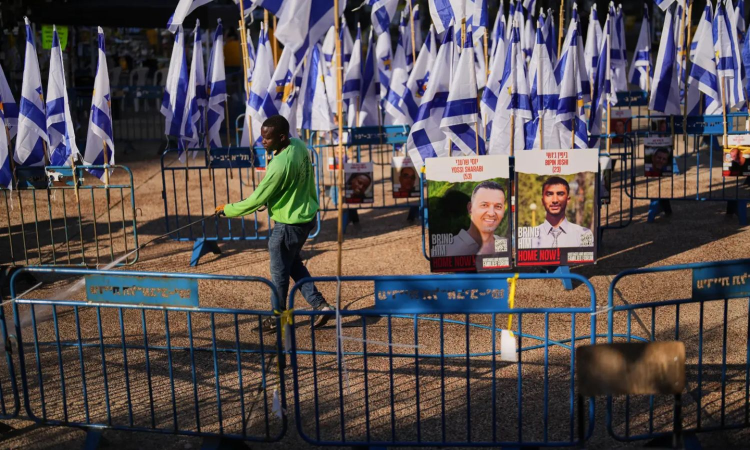Questions loom: Rebuilding Gaza amid uncertainty
Uncertainty persists over when Hamas will return the bodies of 24 hostages believed dead, and over Israel’s demand that a weakened Hamas disarm. The future governance of Gaza also remains unclear.

(Photo: AP)
• A tenuous ceasefire in Gaza held Tuesday after the release of the last living hostages and nearly 2,000 Palestinian prisoners, but key elements of the US-backed regional plan remain unresolved.
Uncertainty persists over when Hamas will return the bodies of 24 hostages believed dead, and over Israel’s demand that a weakened Hamas disarm. The future governance of Gaza also remains unclear.
The Israeli military said troops in northern Gaza opened fire Tuesday on several people approaching across the “yellow line” and ignoring orders to stop. The army did not report casualties. Under the ceasefire, Israel is expected to pull back to positions held before its latest offensive in August.
15-member committee
Egyptian Foreign Minister Badr Abdelatty said 15 Palestinian technocrats have been chosen to manage Gaza’s postwar administration. Their names, he said, have been vetted by Israel and approved by all Palestinian factions, including Hamas.
“We need to deploy them to take care of daily life in Gaza,” Abdelatty told The Associated Press. The committee will work under a “Board of Peace” chaired by U.S. President Donald Trump, which will oversee financing and reconstruction.
Hamas, he said, has accepted that it will have no formal role during the transitional period but supports the committee’s deployment. Abdelatty added that Israel must withdraw from Gaza to allow aid and ensure civilian security, while Hamas must honor its commitments.
Egypt plans to co-host a Gaza reconstruction conference with the U.S. and Germany.
Spain’s accountability call
Spanish Prime Minister Pedro Sánchez said those responsible for Gaza’s destruction must face justice, despite the fragile truce.
“Peace cannot mean forgetting,” Sánchez told Cadena SER radio. “There can be no impunity for the main actors in the genocide perpetrated in Gaza.”
He cited ongoing cases at the International Criminal Court, which has issued arrest warrants for Israeli Prime Minister Benjamin Netanyahu and his former defence minister over Israel’s military campaign. Spain has been one of Europe’s harshest critics of Israel’s two-year war, with Sánchez last month labelling its actions “genocide.”
Recovering remains harder
The International Committee of the Red Cross (ICRC) warned that locating and returning the remains of hostages in Gaza is “an even bigger challenge” than freeing those still alive.
Christian Cardon, an ICRC official, said the remains of four deceased hostages were returned Monday, the same day the final 20 living hostages were freed. “There will be human remains handed over from both sides,” he said, describing the task as a “very sensitive operation.”
Cardon cited dangers from unexploded ordnance and the difficulty of identifying bodies. Some remains, he said, may never be found.
Harsh prison conditions
The prisoner release offered a rare look into life inside Israeli detention centres. Doctors in Ramallah said several of the 14 men treated at the Palestine Medical Complex bore signs of severe beatings.
Kamal Abu Shanab, 51, freed after 18 years in prison, said he was denied medical treatment for a shoulder injury caused by beatings. “For eight months, I wasn’t given even a pill for the pain,” he said.
The Israel Prison Service denied the allegations, saying all inmates are held according to legal standards and receive medical care. However, rights groups have previously documented similar abuse claims.
Rubble equals 13 pyramids
The UN Development Programme estimates Gaza’s destruction at about 55 million tons of rubble — enough to fill New York’s Central Park to a height of 12 meters or build 13 pyramids of Giza.
Jaco Cillers, UNDP’s representative for Palestinian programs, said rebuilding will cost $70 billion, up from $53 billion estimated earlier this year. About $20 billion will be needed in the next three years alone.
He said donors in the Arab world, Europe, and the United States have shown “good indications” of support but gave no specifics.
Erdogan: Pact not peace
Turkish President Recep Tayyip Erdogan said the deal signed in Egypt is only a framework for a ceasefire, not a peace accord. Speaking after returning from Sharm el-Sheikh, he urged the U.S. and other nations to pressure Israel to comply with its terms.
“The only viable solution is a two-state solution recognising Palestinian statehood,” Erdogan said, adding that Turkey will focus on reconstruction and humanitarian aid, including sending container homes to Gaza.
He declined to say whether Turkish troops would join a regional task force, saying talks were ongoing.
As fragile calm takes hold, the world watches whether the ceasefire can withstand the region’s deep political fractures — and whether the promised reconstruction of Gaza can truly begin.
ASSOCIATED PRESS



